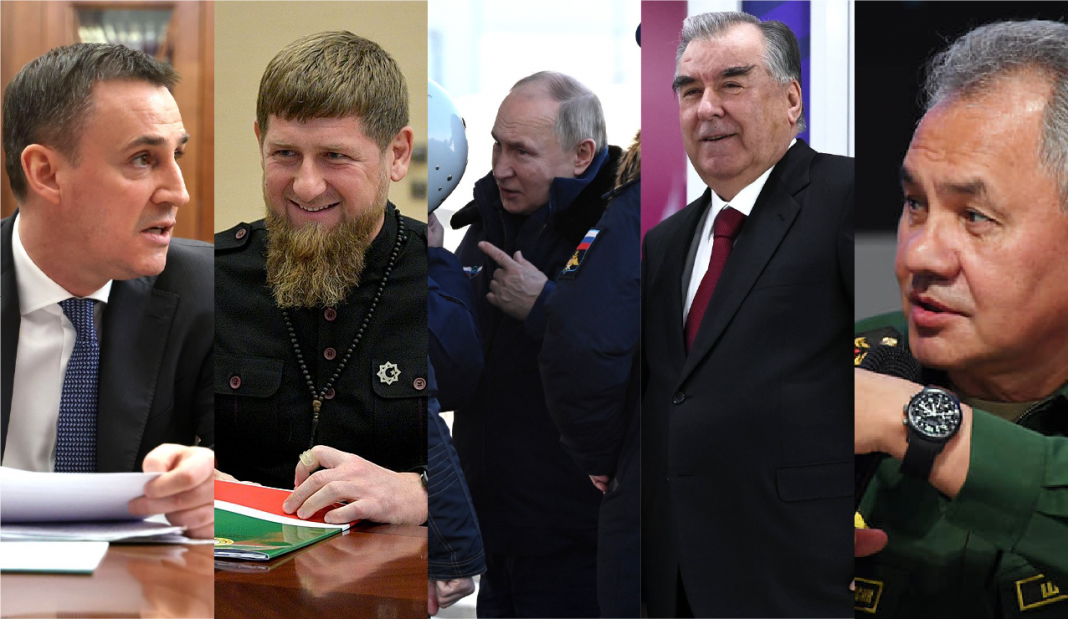This report describes the key events significantly influencing Russia’s political, economic, and social processes.
Assessing the past week’s results, we identify the following trends:
- Military issues are one of the main ones in Vladimir Putin’s current presidential campaign. The capture of Avdiivka was de facto timed to coincide with the second anniversary of the start of large-scale Russian military operations in Ukraine and the presidential elections. As predicted, Avdeevka will become one of the main components of the new Russian military myth, which will be exploited by propaganda and the media for quite a long time. Putin remains true to himself and demonstrates that Defense Minister Sergei Shoigu continues to be in favour, in fact, personifying the so-called “SMO.” Putin pointedly singles out Shoigu, attributing all the laurels to him in the event of military successes and excluding him from criticism in the event of defeats. Thus, Shoigu remains “figure number two” in the informal Russian hierarchy.
- Russia, like any other country, actively uses sports competitions as an occasion for meetings with leaders of allied states. Last week’s international “Games of Future” competition was used to demonstrate that Russia’s isolation lies solely in the West. During meetings with the leaders of Central Asian states, Vladimir Putin repeated the thesis like a mantra that athletes from more than 100 countries are participating in the games. Thanks to Russia’s chairmanship in 2024, this instrument is also actively used in such international organisations as the CIS and BRICS. As Ascolta has repeatedly written before, Russia’s foreign policy strategy for 2024 consists of maximally demonstrating the absence of Russia’s external isolation. Whether it will be possible to implement it will become known closer to the fall.
- Tajikistan is another important partner of Russia. At the same time, the President of Tajikistan, Emomali Rahmon, is a very complex figure. Putin has repeatedly had conflicts of interest with Rakhmon, who is trying to act as the “doyen” of the informal club of heads of Central Asian states. But for all the inconvenience of Rakhmon’s figure, Putin knows that the leader of Tajikistan is a reliable ally. Recently, rumours have been spreading that Rahmon would like to carry out a transition of power in favour of his heir. Still, this issue must also be agreed upon with Putin, who quickly agreed to the transition of power in Turkmenistan but disapproves of similar processes in Tajikistan (for a formal reason: Rakhmon is the same age as Putin, they have one day difference in age, and the departure of the President of Tajikistan could be a signal that it’s time for Putin to leave in the same way).
This report highlights the following most relevant for Russia matters, which occurred during 19-25 February:
1. Meeting of Vladimir Putin with Defense Minister Sergei Shoigu;
2. Meeting of Vladimir Putin with the Minister of Agriculture Dmitry Patrushev;
3. Meeting of Vladimir Putin with the President of the Republika Srpska Milorad Dodik;
4. Meeting of Vladimir Putin with the President of Kyrgyzstan, Sadyr Japarov;
5. Meeting of Vladimir Putin with the President of Kazakhstan Kassym-Jomart Tokayev;
6. Meeting of Vladimir Putin with the President of Uzbekistan Shavkat Mirziyoyev;
7. Meeting of Vladimir Putin with the President of Tajikistan Emomali Rahmon;
8. Meeting of Vladimir Putin with the head of Tatarstan Rustam Minnikhanov;
9. Vladimir Putin’s flight on the Tu-160M missile carrier;
10. Meeting of Vladimir Putin with the head of Chuvashia, Oleg Nikolaev;
11. Meeting of Vladimir Putin with the head of Chechnya, Ramzan Kadyrov;
12. Interview with Sergei Shoigu for TASS;
13. Sergei Karaganov’s article on the strategy of the Russian Federation in the coming “age of wars”.
This Content Is Only For Subscribers
- Meeting of Vladimir Putin with Defense Minister Sergei Shoigu
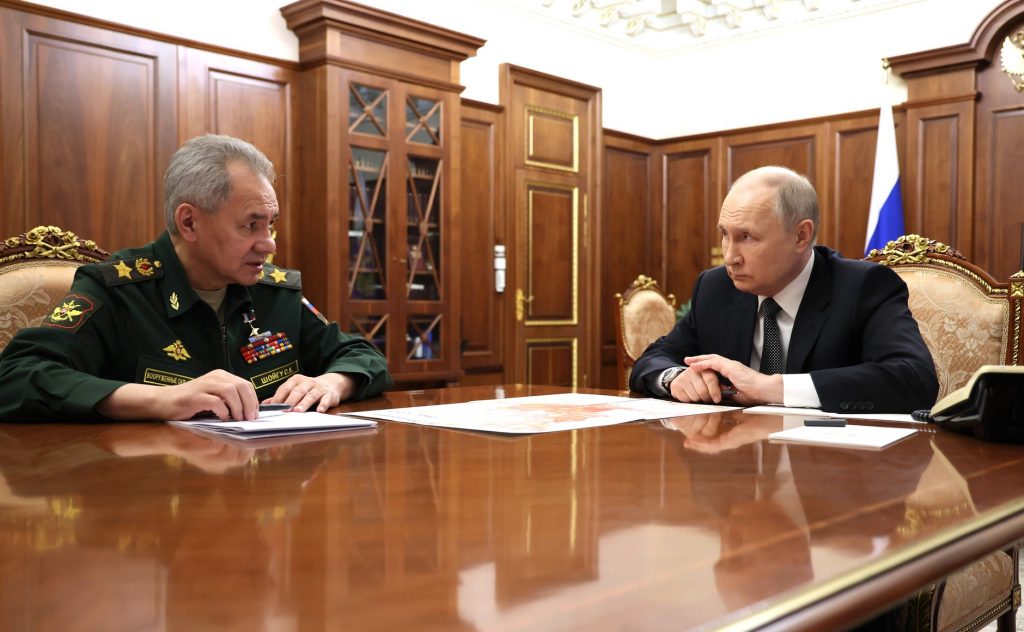
On Tuesday, February 20, a working meeting between Vladimir Putin and Defense Minister Sergei Shoigu took place in the Kremlin. The main topic of the meeting was the situation in Avdiivka, which Russian troops occupied the day before, after the order of the Ukrainian military leadership to withdraw the military from their positions. Putin and Shoigu also discussed the general situation at the front and the prospects for its further development.
Key theses:
- Shoigu: “Almost ten days before, you spoke with the commander of the assault group and the Veterans volunteer detachment, who carried out, in our opinion, a unique operation, passing through a pipe to the south of Avdiivka, going behind enemy lines – almost three and a half kilometres – and having established a fairly significant bridgehead there, to which the rest of the troops then fought their way for another three days, which was done successfully.”
- Shoigu: “A lot of weapons were thrown, a lot of personal weapons, a lot of ATGMs [anti-tank guided missiles], MANPADS [man-portable air defence systems]. Actually, it’s all being tidied up now. A lot of work is going on to clear mines. A lot of things were left behind. But with the understanding that the exit was really running and chaotic, there are no specially mined objects.”
- Shoigu: “Here, Vladimir Vladimirovich, what I would like to draw special attention to: this fortified area was created, created over nine years. For nine years, day after day, underground passages and concrete structures were made, and special lines were made so that it was possible to move without going to the surface. Therefore, of course, the fact that the enemy’s resistance was broken here is a great success for the mixed grouping of troops, units, and formations – all without exception. One can, of course, mention the Aerospace Forces, Army Aviation, and Attack Aviation. Here, much depended on whether we would give the enemy a respite for at least some time.”
- Putin: “Now regarding the prisoners. I know, and this has always been the case with us – during the [so-called] “special military operation”, and now we must continue this practice – about prisoners, we must act in strict accordance with certain international legal documents and international conventions. I know we have always acted this way: we supported them with dignity. I ask you to adhere to the same practice in this regard.”
- Putin: “There is one more area that I would like to pay attention to and talk to you about. I also spoke with Mikhail Yuryevich [Teplinsky] the day before yesterday; he reported to me about the settlement of Krynki on the left bank of the Dnipro. This question arose, if you remember, even during the Direct Line. I said there then that I don’t understand why the enemy is doing this to his people, sending them there to almost certain death and treating them as if they weren’t their people at all.”
- Shoigu: “I know about the report of Colonel General Teplinsky. I confirm his report; it is true: Krynki has been cleared. We stood virtually along the entire coast of the Krynka and Konka rivers. Today, there are observation posts and troops stationed there.”
- Shoigu: “Perhaps for the first time here, we saw the delivery of ammunition, food, and medicine not only by boats but also by large ones – these are no longer quadrocopters – octocopters, someone calls them “Baba Yaga”, which can carry large loads.”.
- Shoigu: “In principle, of course, on the one hand, we understand why this is being done and is timed to coincide with different dates: for us, it’s either for Ramstein, when some kind of activity begins when they gather there and discuss how to help Ukraine, or it is the adoption of a budget and the allocation of Pentagon funds to help Ukraine, as was the case at the end of last year, when they began very active actions here, in the Kherson direction. And according to all the radio interceptions, according to all the information, they had to show at least some success…”
- Shoigu: “Here we cannot say that their military science has reached unprecedented heights, allowing them… We have seen what heights they reached in different places: Afghanistan, Libya, Iraq, and Syria. In Syria, just to remind you, maybe this had gone away; when the decision was made to support the government of [Bashar] Assad, Assad controlled 18 per cent of the country. Today, it is over 90 [per cent], and in fact, the very international terrorism that the coalition of 67 countries was going to defeat there has been defeated.”
- Putin: “There is one more question that is unrelated to the current events on the line of contact within the framework of a special military operation. This question relates to the noise that has been rising lately in the West, including the United States, about the deployment of nuclear weapons in space. Our position is clear and transparent: we have always been categorically against the deployment of nuclear weapons in space. On the contrary, we call not only to comply with all agreements that exist in this matter but also propose to strengthen this joint work greatly.”
- Shoigu: “First of all, this does not exist. Secondly, they know that we don’t have this… Placing nuclear weapons in space and using any other elements of nuclear weapons on satellites or creating fields that will not allow satellites to operate effectively.”
- Putin: “As for negotiations: we have never been against negotiations – we have always been for negotiations. This also applies to Ukraine, the Ukrainian direction. I have already said a hundred times that we did not interrupt the dialogue – it was the Ukrainian side that interrupted the dialogue and on direct command from London and Washington. The Ukrainian side is talking about this directly – at the official level. I don’t know why they do this, but they say it publicly.”
- Putin: “As for strategic stability, we have never refused dialogue here either. But, of course, to pretend that the United States and the West, on the one hand, are calling for the strategic defeat of Russia and, on the other hand, allegedly intend and want to negotiate with us on strategic stability, believing that one issue is in no way connected with the other, – this cannot be done. If they seek to inflict a strategic defeat on us, we must consider what strategic stability means for our country.”
Outcomes and outlook:
Military issues are one of the main ones in Vladimir Putin’s current presidential campaign. The capture of Avdiivka was de facto timed to coincide with the second anniversary of the start of large-scale Russian military operations in Ukraine and the presidential elections. As predicted, Avdiivka will become one of the main components of the new Russian military myth, which will be exploited by propaganda and the media for quite a long time. Putin remains true to himself and demonstrates that Defense Minister Sergei Shoigu continues to be in favour, in fact, personifying the so-called “SMO.” Putin pointedly singles out Shoigu, attributing all the laurels to him in the event of military successes and excluding him from criticism in the event of defeats. Thus, Shoigu remains “figure number two” in the informal Russian hierarchy.
- Meeting of Vladimir Putin with the Minister of Agriculture Dmitry Patrushev
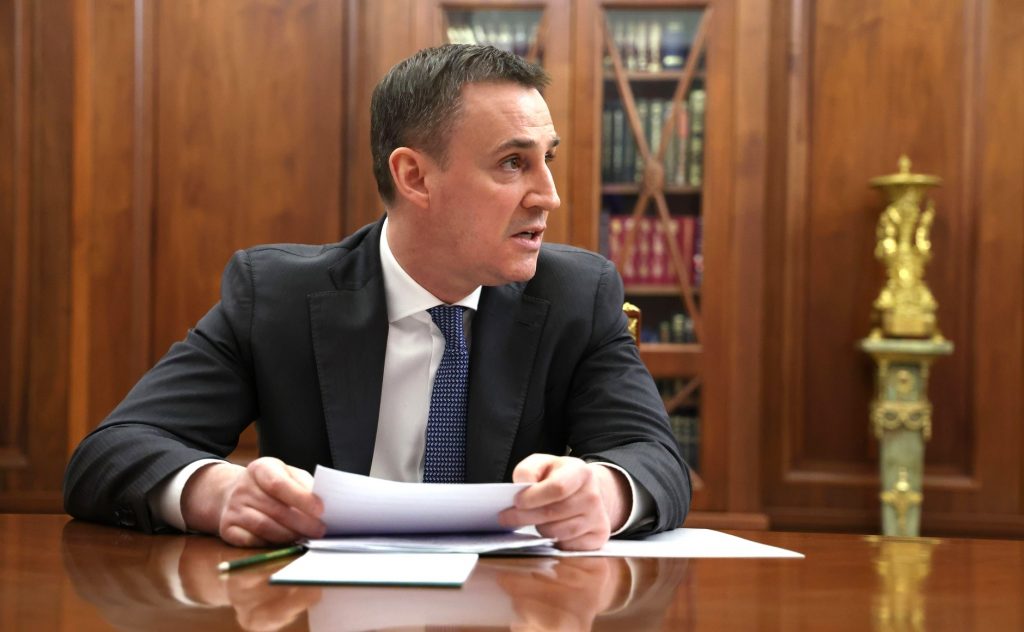
On Tuesday, February 20, Vladimir Putin met with the Minister of Agriculture, Dmitry Patrushev. The details of the meeting were not reported; one of the topics of conversation was the supply of humanitarian cargo to six countries of the African continent, the implementation of which was reported by the relevant minister.
Outcomes and outlook:
Dmitry Patrushev remains one of those figures whom Putin favours: thanks to the actions of Patrushev Jr., Russia has really made a serious breakthrough in the agricultural sector, not only withstanding the pressure of Western sanctions but also actively exporting grain and agricultural products to the “third world”-countries, particularly in Africa. Agriculture (along with nuclear energy, weapons, oil and gas) is one of the most important exports and one of the levers of influence on the African continent. In addition, Patrushev Jr. is an example of the gradual inclusion into the political process at the highest level of representatives of the younger generation and representatives of the “new nobility” – the children of those who have earned preferences and power for their faithful service to Putin himself.
- Meeting of Vladimir Putin with the President of the Republika Srpska Milorad Dodik
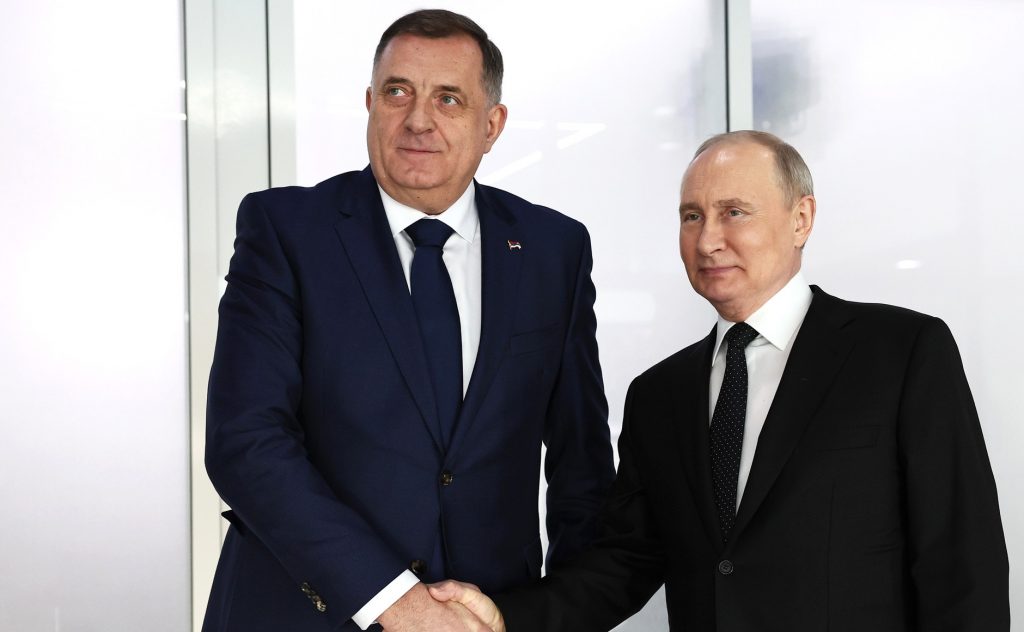
On Wednesday, February 21, Vladimir Putin went to Kazan, where he took part in several public events and held several meetings with leaders of other states. The main purpose of the trip to Kazan was to participate in the “Games of the Future” competition, in which representatives of a number of countries took part. The Russian President held his first meeting with the President of the Republika Srpska Milorad Dodik. During the conversation, the parties discussed bilateral relations and also touched upon some historical events.
Key theses:
- Putin: “Representatives of the leadership of Republika Srpska visit us regularly, and we cooperate in various areas. I am sure that this visit of yours will also be beneficial; we can use the time to discuss bilateral relations in several areas.”
- Putin: “We know that the situation in the republic is not easy. We are ready to talk about this, too.”
- Putin: “We are grateful to you for maintaining regular relations with Russia, supporting many of our initiatives, including such a noble, in my opinion, event associated with the memory of the victims of Nazism, even personally taking part in the procession of the “Immortal shelf”.
- Dodik: “Of course, we live in a difficult situation and are glad you understand. Recently, in your annual address, you especially noted that you understand the relations that we have there. They are quite complex, they are not easy, these relationships are really very complex.”
- Dodik: “They are further complicated by the fact that we are still under the protectorate of the West and under conditions of international intervention – primarily Western. We moved away from Dayton to abuse, even imposition, on the part of one German citizen who was not appointed high representative by the decision of the Security Council. Thank you for considering this issue. And if he were given powers, he would abolish the Republika Srpska.”
- Dodik: “In these circumstances, we are trying to discourage any opportunity to join sanctions against Russia. They [the West] are trying hard enough; every day, they literally [try] to persuade us to do this. And, of course, without a doubt, we refuse to move towards NATO membership. Even though we are again subjected to great pressure.”
- Dodik: “The Serbs, as you know, were bombed twice, once the Republika Srpska, then, the second time, Serbia by NATO. I can witness that there are now a huge number of young people – literally newborns – who are literally feeling the effects of the depleted uranium that we were bombarded with in 1995 and 2000. The incidence of malignant diseases caused by these bombings increased several times, even ten times. So it is illogical and abnormal that we could, in principle, even accept NATO membership.”
Outcomes and outlook:
Milorad Dodik is one of the figures of Russian influence in the Balkans. Occupying the post of President of Republika Srpska, an entity within Bosnia and Herzegovina, he pursues a policy of pressure on the confederation’s leadership and the High Representative Christian Schmidt, who was appointed without following the procedure. In January 2024, Dodik threatened to secede from the Republika Srpska confederation of Bosnia and Herzegovina, and he has repeatedly questioned the advisability of complying with the 1995 Dayton Accords. Dodik is accused of separatism. However, using energy leverage (supplies of gas and other products from Russia to the Republika Srpska), as well as friendship with Serbian President Aleksandar Vucic, Dodik continues to play an essential role as an agent of influence for Russia and Serbia, preventing the Euro-Atlanticists from strengthening their positions in the region.
- Meeting of Vladimir Putin with the President of Kyrgyzstan, Sadyr Japarov
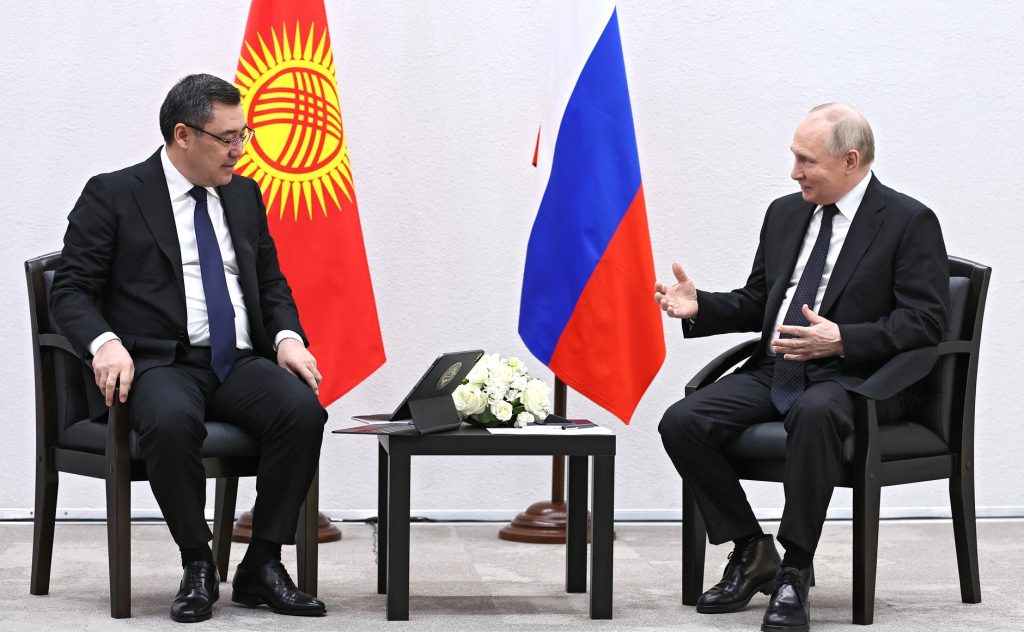
On Wednesday, February 21, as part of his visit to Kazan, Vladimir Putin met with the President of Kyrgyzstan, Sadyr Japarov, who visited Russia on a working visit and participated in the opening of the international competition “Games of Future”. According to the official statements of the parties, during the meeting, bilateral relations and prospects for their further development were discussed.
Key theses:
- Putin: “As for our bilateral relations, they are based on our fundamental agreement and are developing successfully in all directions.”
- Putin: “Russia is and remains one of the main trade and economic partners; 35 per cent of direct investments also came from Russia to the Kyrgyz economy; we will continue to work on these issues.”
- Putin: “In the humanitarian sphere, everything is developing progressively in our country. We are grateful to you for your attention to developing the Russian language; we opened schools not long ago. I remember well the visit at the end of last year – in October, I think it was – to your country. Thank you very much for your hospitality.”
Outcomes and outlook:
Like any other country, Russia actively uses sports competitions as an occasion for meetings with leaders of allied states. Kyrgyzstan is Russia’s most important partner in the Central Asian region, and Sadyr Japarov is considered one of Putin’s most reliable and consistent allies. In fact, this meeting is a “settling of watches” and a demonstration of Putin’s handshake, which is very important, including on the eve of the presidential elections, and as a signal to the outside world.
- Meeting of Vladimir Putin with the President of Kazakhstan Kassym-Jomart Tokayev
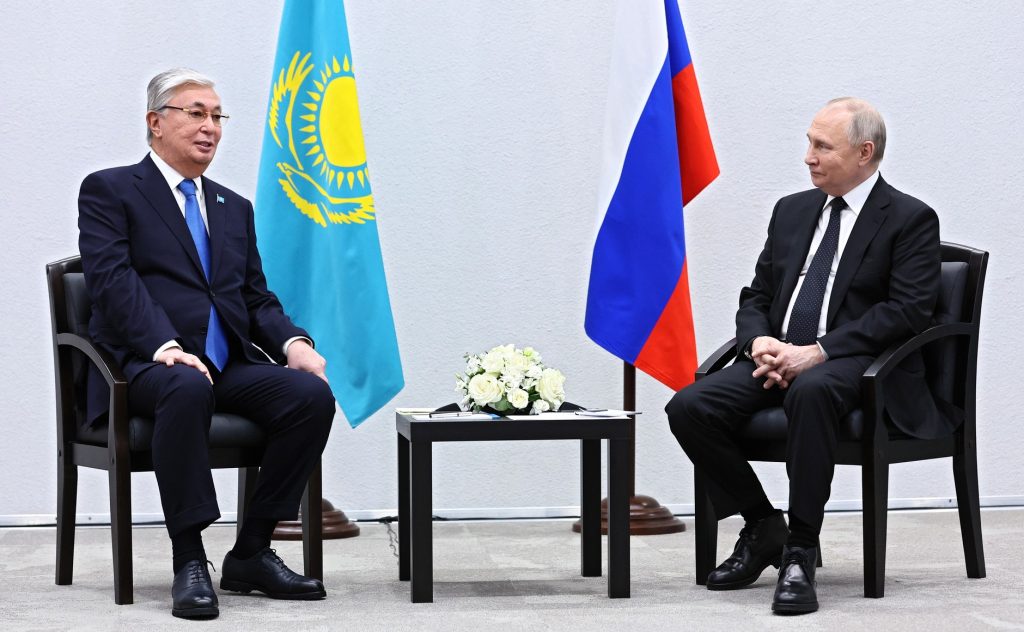
On Wednesday, February 21, as part of his visit to Kazan, Vladimir Putin met with the President of Kazakhstan, Kassym-Jomart Tokayev, who visited Russia on a working visit and took part in the opening of the international competition “Games of Future”. According to the official statements of the parties, during the meeting, bilateral relations and prospects for their further development were discussed. Putin and Tokayev also touched upon economic issues and the general situation on the eve of the presidential elections in Russia.
Key theses:
- Putin: “As for our bilateral relations, they are thriving in many ways – what do you mean in many ways? – in almost all areas vitally important to us. I also remember our visit, the visit of our delegation to Kazakhstan last year. Then everything went well. We have outlined directions for further development. By the way, thank you very much for the very cordial and business-like reception.”
- Tokayev: “I am sincerely glad that I am here today. Indeed, “Games of the Future” is a unique format. This is IT combined with sports, which probably doesn’t look quite usual, but, on the other hand, it’s a unique format. We brought a solid team here and hope for some positive results.”
- Tokayev: “We are all waiting for the presidential elections, which will take place on March 17 in Russia. Naturally, there are no doubts about the final result, because Russia, under your authoritative leadership, is achieving noticeable, impressive successes. In fact, with your statements and actions, you are shaping the global agenda.”
- Tokayev: “As you said in a recent interview, regarding purchasing power parity, the Russian economy has become the first in Europe. This also needs to be taken into account. Naturally, this has a positive effect on the progress of our cooperation and the implementation of the agreements reached during your state visit to Kazakhstan in November last year.”
- Tokayev: “We are grateful that an agreement was reached on constructing thermal power plants in three cities of Kazakhstan, on constructing two state district power plants. The result is obvious. On the other hand, we negotiated in St. Petersburg to construct a gas pipeline from Kazakhstan to China. There, we had some issues that required additional settlement, and results were achieved that, I think, are very positive – both for our side and, I think, for the Russian side too. I won’t go into detail now because some details still need to be discussed. In any case, the main direction has been determined.”
Outcomes and outlook:
Putin’s meeting with Kazakh President Tokayev is essential, as information has appeared in the Western media about the cooling of relations between Moscow and Astana. Tokayev, as a diplomat, makes it clear that he remains faithful to the old agreements, and Kazakhstan, despite its multi-vector policy, can continue to be considered a reliable partner of Russia.
- Meeting of Vladimir Putin with the President of Uzbekistan Shavkat Mirziyoyev
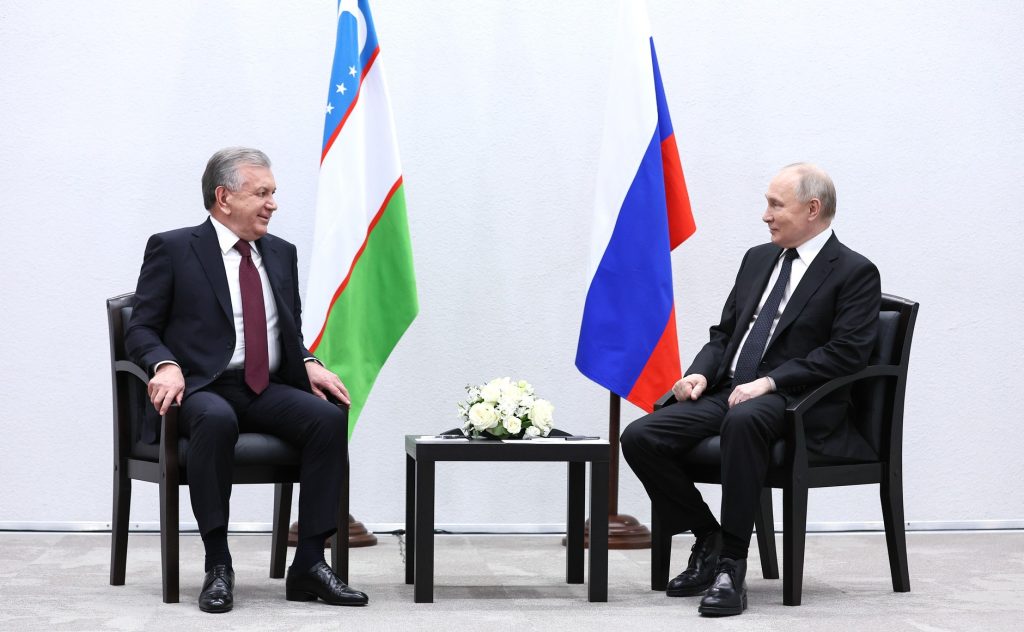
On Wednesday, February 21, as part of his visit to Kazan, Vladimir Putin met with the President of Uzbekistan, Shavkat Mirziyoyev, who visited Russia on a working visit and took part in the opening of the international competition “Games of Future”. According to the official statements of the parties, during the meeting, bilateral relations and prospects for their further development were discussed. During previous meetings, the issue of the upcoming presidential elections in Russia was raised and the promotion of joint projects in the energy sector.
Key theses:
- Putin: “Quite recently, on your and my initiative, a large Russian government delegation was in Uzbekistan, in Tashkent, meeting with colleagues. I know you also found the time to receive some of them from our delegation. It seems to me that we need to talk about this, maybe in a few words; I would like to hear your assessment of what is happening. Our economic ties are intensively developing in the main areas; good prospects are being built.”
- Mirziyoyev: “Soon, there will be a big political event in Russia – the presidential election. We are sure that the people of Russia have probably already voted. Uzbekistan is confident in your absolute victory. As we agreed, one of the first visits will be to Uzbekistan. As always, I told my entire team that this visit should be historic and eventful in all areas. I am preparing very seriously.”
- Mirziyoyev: “And the trade turnover is more than 10 billion – we didn’t have such figures. But your team and I went through all the issues. We didn’t set ten, we want to spend five billion this year, in 2024. That is, we have real projects, real performers and real regions, real directions, big projects. You have a big team on your side. And they went through each point with a pencil in their hands; I talked to everyone in detail, and there is a real result.”
Outcomes and outlook:
Uzbekistan also remains among Russia’s loyal allies – despite attempts by Western intelligence services (in particular, British) to increase their influence in the region. Russia recently launched a project to build a gas pipeline to Uzbekistan. The country has become one of the additional bridges between Russia, China, and Russia and Afghanistan. At the same time, Uzbekistan is interested in having Russia as an ally in countering the possible expansion of the Taliban. For millions of Uzbeks (the most dynamically growing people in the post-Soviet space, which by 2035 could number 50 million citizens), Russia is a field for making money. According to some reports, Uzbekistan is helping Russia circumvent Western sanctions. Thus, Mirziyoyev demonstrates loyalty and interest in developing and strengthening relations with Russia.
- Meeting of Vladimir Putin with the President of Tajikistan Emomali Rahmon
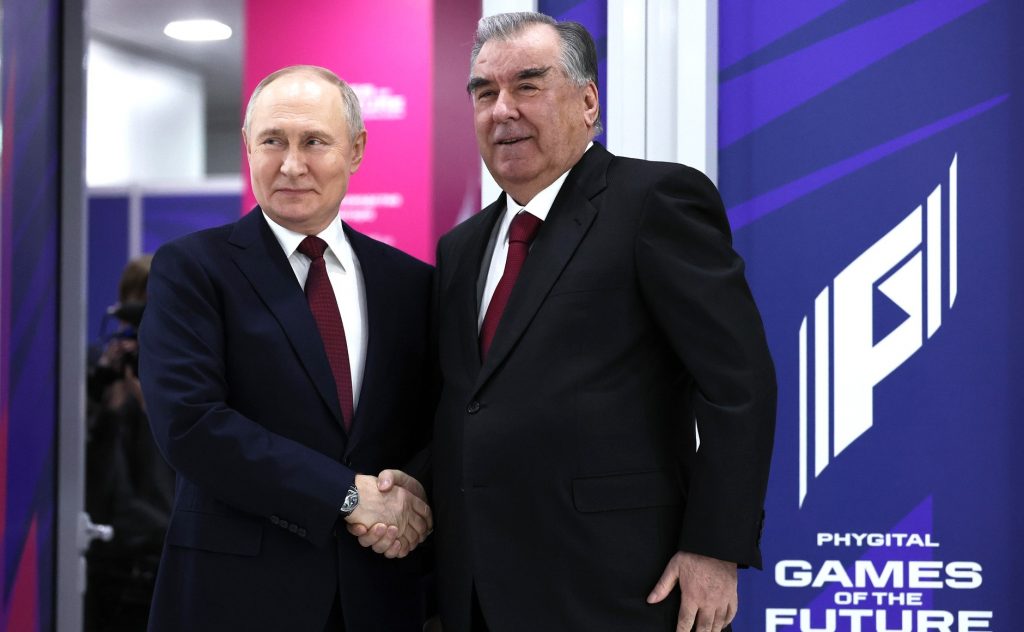
On Wednesday, February 21, as part of his visit to Kazan, Vladimir Putin met with the President of Tajikistan, Emomali Rahmon, who visited Russia on a working visit and took part in the opening of the international competition “Games of Future”. According to the official statements of the parties, during the meeting, bilateral relations and prospects for their further development were discussed.
Key theses:
- Putin: “As for our bilateral relations, we, of course, use the opportunity to communicate within the framework of this event to discuss bilateral relations. I would like to note that they are developing very successfully. I don’t know a single problem that we wouldn’t solve, especially after our meetings.”
- Putin: “We will move in all directions. First of all, of course, this concerns the economy. I won’t go into details, but thanks to our relationships, I think this is also a serious factor – we are moving forward and, I’m sure, we will move at a good pace.”
- Rahmon: “As you noted, we recently discussed our bilateral relations in more detail. We practically do not have any unresolved issues. There are some nuances. I think that today we will discuss and find mutually acceptable solutions.”
- Rakhmon: “I wish you success – success in everything. And above all, good health to you. And nerves of steel.”
Outcomes and outlook:
Tajikistan is another important partner of Russia. At the same time, the President of Tajikistan, Emomali Rahmon, is a very complex figure. Putin has repeatedly had conflicts of interest with Rakhmon, who is trying to act as the “doyen” of the informal club of heads of Central Asian states. But for all the inconvenience of Rakhmon’s figure, Putin knows that the leader of Tajikistan is a reliable ally. Recently, rumours have been spreading that Rahmon would like to transition power in favour of his heir. Still, this issue must also be agreed upon with Putin, who easily agreed to the transition of power in Turkmenistan but does not approve of similar processes in Tajikistan (for a formal reason: Rakhmon is the same age as Putin, they have one day difference in age, and the departure of the President of Tajikistan could be a signal that it’s time for Putin to leave in the same way).
- Meeting of Vladimir Putin with the head of Tatarstan Rustam Minnikhanov
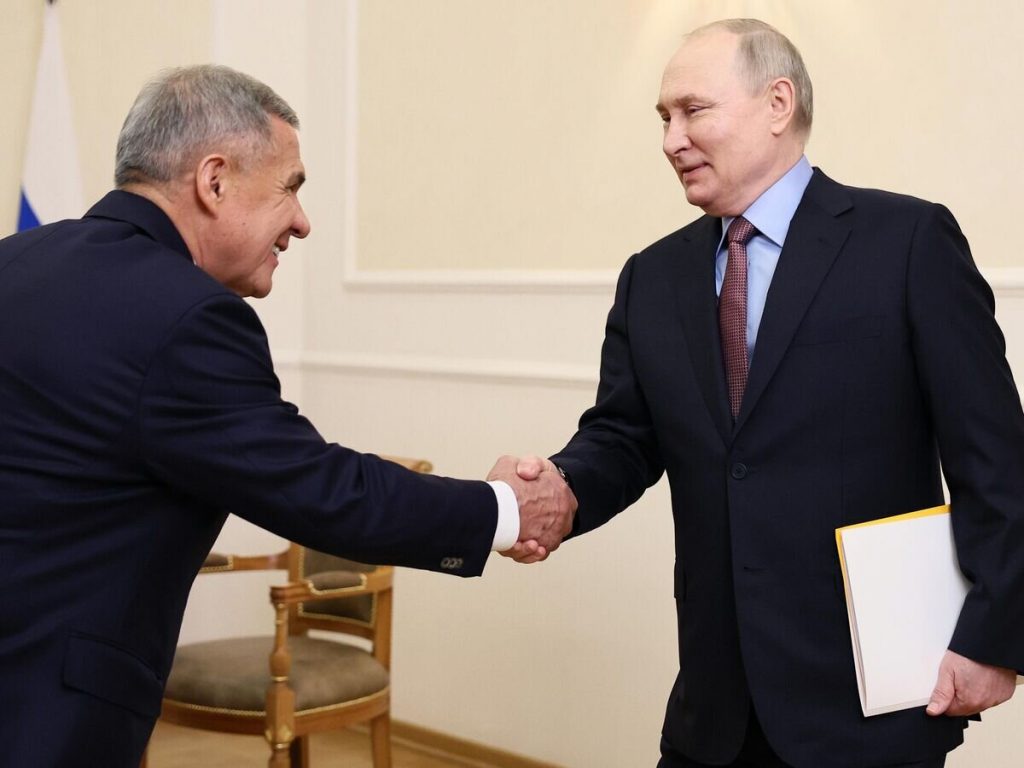
On Wednesday, February 21, at the end of a series of meetings with the leaders of the Central Asian states, which took place as part of the international competition “Games of Future”, Vladimir Putin held a meeting with the Head of Tatarstan Rustam Minnikhanov. In particular, the Russian President thanked the Head of Tatarstan for organising the competition and also drew attention to several issues related to the social matters of Tatarstan.
Key theses:
- Minikhanov: “In the morning, we saw off the respected President of Tajikistan [Emomali Rahmon]. He said: “Give my bow and respect to Vladimir Vladimirovich.” He was very satisfied”.
- “Firstly, I would like to report on our activities that are related to the [so-called] “SMO.” We are fully connected on all issues and are working on them.”
- “Here is support for military units, support for the victims’ families, and, most importantly, work in sponsored territories. We work everywhere. In addition, we accept children from our sponsored territories for summer holidays. There is much work on humanitarian cargo: enterprises and private traders are here. We have heads of municipalities who have already met with our fighters from these territories six, ten times.”
- “The most important thing is what? We, of course, have had a decline – there was a severe drought – in the village in crop production. But still, despite all the difficulties, we collected 3.6 million tons of grain instead of more than five. We are provided with food, and all issues have been resolved.”
- “The economy is developing, the share of industrial products [is growing]. Regarding oil production, foreign trade turnover amounted to $14 billion. We produce over 35 million [tons of oil], but OPEC parameters limit production. Already last year, 23.7 million tons of oil were processed with more than 99 percent depth. Two oil refineries are operating successfully. And, of course, we have great prospects in petrochemicals. In 2025, the SIBUR group will launch a large complex, “Ethylene 600” – the same amount of ethylene as we produce in Nizhnekamsk and its derivatives.”
- “Work is underway both on driverless cars and on hydrogen issues. The most important thing, Vladimir Vladimirovich, our Ford company left, the Sollers company found a model range, and today they produce 10 thousand commercial vehicles. This year, they will make 30 thousand vehicles. They are very popular and worthy cars. We produce “Aurus” – “Senate”, “Commandant” – work is also underway in a special economic zone.”
Outcomes and outlook:
Minnikhanov is one of those heads of subjects of the Federation who also influences processes at the national level. The Tatar lobby in Moscow is quite strong; Minnikhanov shows how it can influence processes in the capital and, at the same time, eradicate manifestations of nationalism and separatism. Putin trusts Minnikhanov. The current opening of the “Games of the Future” sports competitions is in many ways reminiscent of the USSR’s attempt in 1984 to organise, in contrast to the United States, which is hosting the Olympic Games, its own “Goodwill Games”, in which athletes from countries friendly to the USSR took part. The Soviet Union itself boycotted the games in Los Angeles. Putin liked the initiative of Rustam Minnikhanov and Murat Kabaev to hold the “Games of Future” in Kazan – for him; this is not only an election step but also an opportunity to show that despite attempts to exclude Russian athletes from the world sports process, Russia is quite capable of organising alternative competitions.
- Vladimir Putin’s flight on the Tu-160M missile carrier
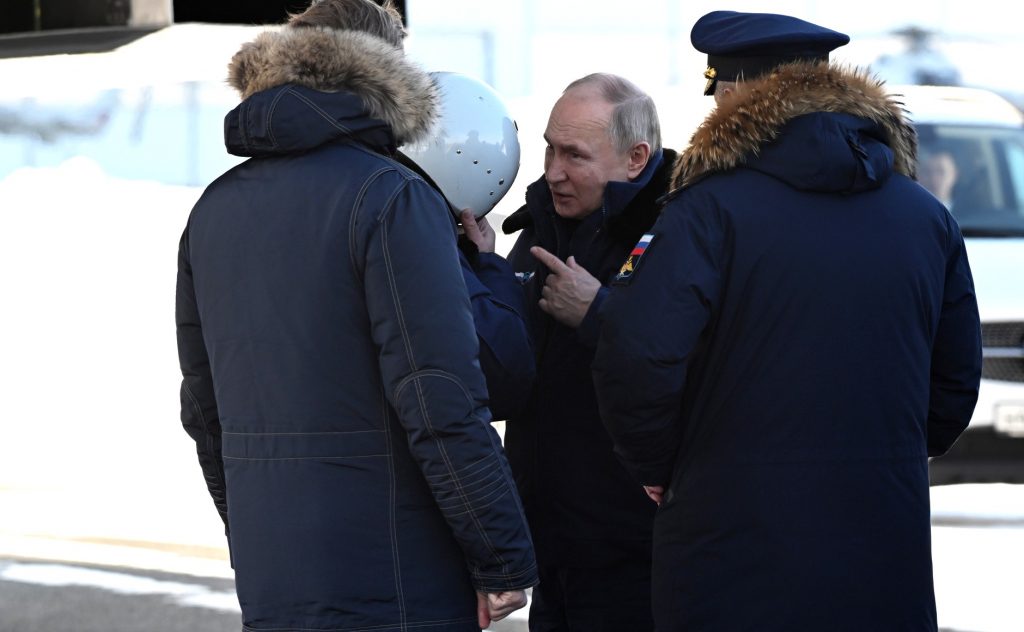
On Thursday, February 22, concluding his visit to Tatarstan, Vladimir Putin visited the Kazan Aviation Plant, where he met with enterprise employees and took a flight on the Tu-160M missile carrier. According to official data, the flight lasted about 30 minutes. During this time, the Russian president had the opportunity to personally test an updated version of the largest supersonic aircraft in the history of military aviation, one of the world’s most powerful combat aircraft.
Outcomes and outlook:
It is already a traditional election trick when Putin demonstrates masculinity and shape to increase his rating. This flight should be considered nothing more than an election “picture”, as well as another opportunity to show the prospects of the Russian military-industrial complex.
- Meeting of Vladimir Putin with the head of Chuvashia, Oleg Nikolaev
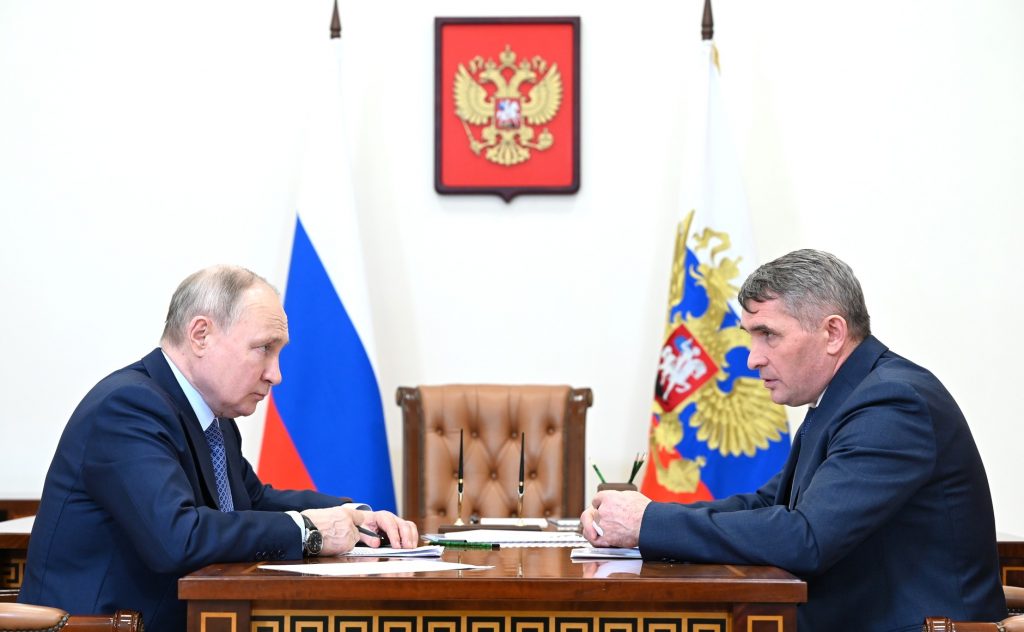
On Thursday, February 22, after completing his visit to Kazan, Vladimir Putin visited neighbouring Chuvashia, where, in particular, he held a meeting on the socio-economic development of the Chuvash Republic and also held a separate meeting with the head of the Republic Oleg Nikolaev. As during other similar visits of Putin to Russian regions, the prospects for the development of the Republic, as well as current economic and social indicators, were discussed during the meeting.
Outcomes and outlook:
Oleg Nikolaev is named among the most promising regional leaders who may move to work in Moscow soon. Thus, the inclusion of Nikolaev in the information agenda, emphasising his merits in comparison with eight dozen other heads of subjects of the Federation, is a gradual strengthening of the figure of the head of Chuvashia in the all-Russian agenda.
- Meeting of Vladimir Putin with the head of Chechnya, Ramzan Kadyrov
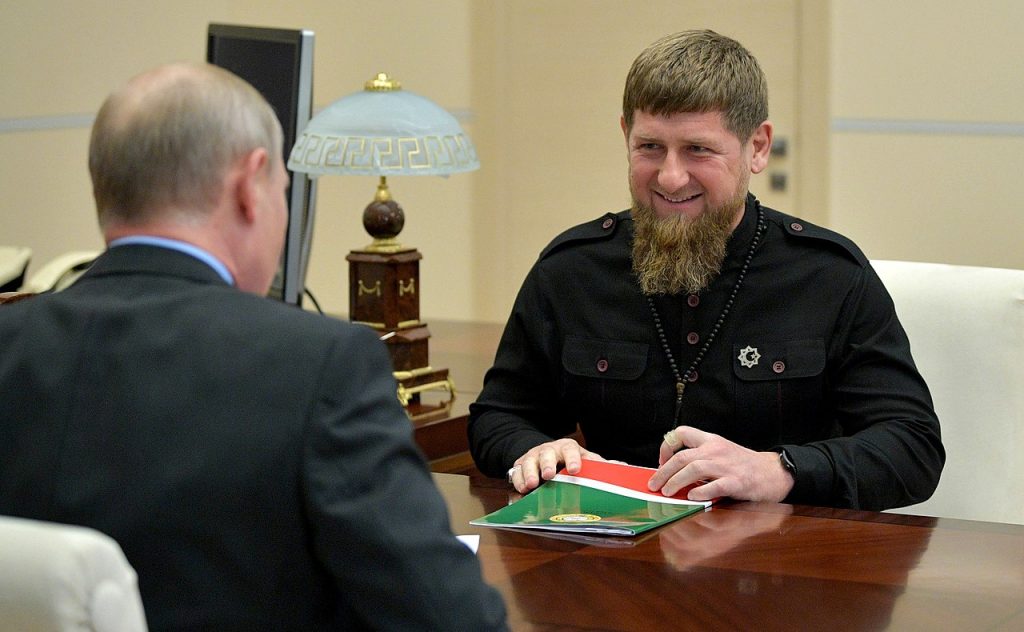
On Friday, February 23, Vladimir Putin met with the Head of Chechnya, Ramzan Kadyrov, in the Kremlin. It is noteworthy that no official report was published following the meeting. Also, no photographs or other information about the meeting were posted on the president’s website. At the same time, the Kremlin press service stated that the meeting discussed issues of the region’s socio-economic development and the republic’s contribution to the [so-called] “SMO”.
Outcomes and outlook:
Ramzan Kadyrov remains an influential figure in Putin’s entourage and the system built by Putin. In fact, every meeting between Putin and Kadyrov is, first of all, a message to the Caucasus region and those exercising power in the region that Kadyrov is an unshakable figure, and the president not only has no complaints against Kadyrov but is also ready to support him in numerous intrigues and the disputes observed in the region.
At the same time, it is essential to note that Putin’s pre-election tour of Russian regions has not yet included a trip to the Caucasus region. It is possible that this meeting could have been used to prepare for such a visit. Moreover, against the backdrop of information that appeared again in Ukrainian telegram channels about another deterioration in Kadyrov’s health, the very fact of the meeting could demonstrate the opposite. However, the absence of a photo report and any other meeting details may indicate that specific problems may still exist.
- Interview with Sergei Shoigu for TASS
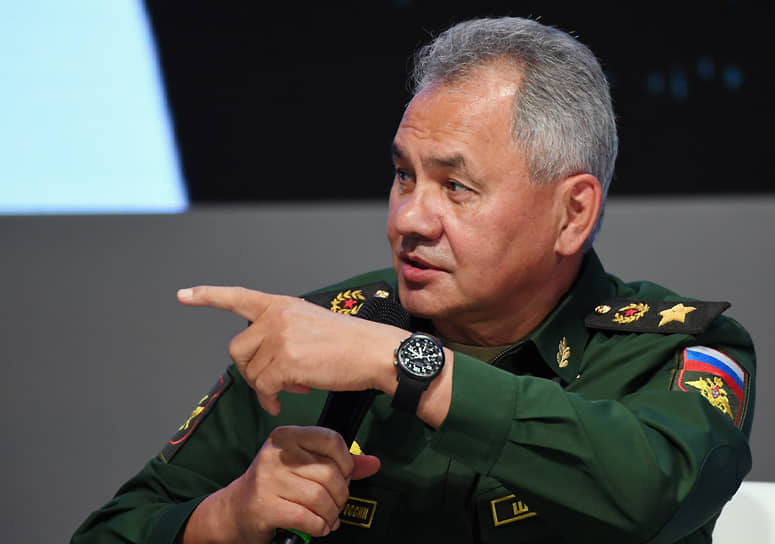
On Tuesday, February 20, Russian Defense Minister Sergei Shoigu gave an interview to the Russian news agency TASS. In it, he spoke about the advance of Russian troops in Avdiivka (temporarily occupied territory of Ukraine), as well as about changes in the Russian army during the so-called “SMO”. Shoigu also once again answered the question of whether Russia will deploy nuclear weapons in space and how Vladimir Putin personally controls the troops.
Key theses:
- “In fact, the situation formed as follows. At the beginning of last year, the General Staff and all types of intelligence revealed information that a serious counter-offensive was being prepared. By the word “serious”, we mean when it is not 100, not 200 people, when it was a group of almost 160 thousand, to be more precise, 110 battalions, that is, 30 battalions almost in reserve, 800 tanks, almost 150 aviation assets – airplanes and helicopters, more than 2.5 thousand armoured vehicles. Naturally, having realised that such a grouping was being prepared, all types of reconnaissance were put into operation – this includes space, electronic reconnaissance, deep reconnaissance, military reconnaissance, and everything related to the control of vehicles and the movement of sea and railway vessels. At this moment, it was necessary to understand what would happen by this moment, and when this moment would come, by the concentration of all the necessary enemy forces.”
- “Realising that we cannot waste time waiting while we reconnoitre all directions, the president decided to create a defence line in depth along the entire line of combat contact line, which totalled more than 2 thousand km. But it is not easy – a defence line in depth. This defence allows you to conduct not just defence, but active defence, that is, to attack the intended direction, but at the same time to knock out, knock out, knock out the enemy’s forces and weapons.”
- “There are only 67 NATO special reconnaissance satellites at the moment. And let’s take together the group of satellites of the countries that support Ukraine. We get 260 satellites that work against us almost online and transmit information about movements and many other things.”
- “And, of course, the result of this operation showed that their [Western] methods, their technologies of warfare – they are not so unique, successful, because neither you nor I can name a single place where they would have carried out at least one more or less [successful] operation – be it Afghanistan, Iraq, Libya, Syria.”
- “Having lost 166 thousand killed and wounded, more than 800 tanks, almost 2.4 thousand armoured combat vehicles, various armoured personnel carriers, infantry fighting vehicles, Bradleys, etc. In fact, from what they have today, more than half of the Leopards are destroyed; they have lost 123 aircraft and helicopters.”
- “There is such a journal as Foreign Affairs, and there is a statement written by one of the highly experienced and significant generals. The longer the counteraction operation continues, the stronger, more equipped, more experienced, and more united the Russian army becomes. I completely agree with this because even at the end of 2023, we see how much the level of all commanders and all our units has grown.”
- “Today, offensive operations from the western direction continue, and two days ago, it was, in my opinion, 32 square km, then today, Koksokhim has already been liberated, and in general, the liberated area is 72 square km – almost twice as much as since the beginning of the offensive actions of Russian troops in all directions, 317 square km have been liberated from the Ukrainian Armed Forces. Therefore, the operation was prepared carefully and thoroughly. Here, the General Staff did everything to ensure that it passed with minimal losses and maximum efficiency.”
- “Krynki, or rather the Kherson direction, is another one of the directions. We are not on high alert there, but as the commander of the Dnepr group, Colonel General Mikhail Teplinsky, reported, all cleanup work has indeed been completed. But taking into account the fact that there were many different people in the basements, and recently they were literally, I’m not talking in allegories, crying and asking for evacuation, we, naturally, offered, offer and continue to offer them to surrender. But we haven’t heard such requests for probably a day now. In the last 24 hours, two people showed up; they were asked to surrender, but, unfortunately, they refused.”
- “During this time [of full-scale war], many important measures were taken. Firstly, funds were allocated to mobilise industry, which made it possible to increase the production of ammunition. Secondly, many people have never dealt with ammunition or repairing equipment, but now they have taken it up, and there are a lot of them. We have an enterprise that, starting from scratch, in four months produces as much ammunition as virtually all NATO countries produce in a month. This is probably a new generation of entrepreneurs who work for the country, for victory, and there are many of them.”
- “A thing has appeared that we call the “people’s defense-industrial complex.” People’s, because, imagine, a man baked bread, stopped, took equipment with his own money and started producing FPV drones. He doesn’t take money; he asks for components. There are hundreds of them. There are hundreds of enterprises, not people. They make components and equipment. The guys bought 1.2 thousand machines in one of the countries overnight. They removed the buses from the garage and made a workshop in it. We need to go and see. Indeed, the whole country has risen and is working for victory.”
- “Well, as for the Supreme Commander-in-Chief, I would not use such [the term] “inform.” He is constantly aware of events. And naturally, we have reports every day and more than once. They happen both day and night. If necessary, we report immediately. Well, if the situation is such, a Supreme decision is necessary. But there, in addition to such daily regularity, there is, naturally, something that requires a personal report. When we arrive, the Chiefs of the General Staff, we lay out the cards, discuss, and make decisions. Here, this work is established, and here, it is not about informing the supreme commander, but about managing the operation and making decisions when necessary at the level of the supreme commander.”
Outcomes and outlook:
De facto, Shoigu gave an interview that summed up the outcome of the battle for Avdiivka, the outcome of two years of war in Ukraine, and outlined new prospects. Shoigu has been given the role of the main actor in this process. But simultaneously, he makes it clear that he also has his own “favourites.” Emphasising the birth of General Teplinsky shows that Shoigu has resolved the issues with the internal army front, the representatives of which were Surovikin and Teplinsky. Now Teplinsky – as Shoigu shows – is a member of the team. Shoigu actively gives information passes to Putin and shows that he is a member of Putin’s team. In many ways, the interview is misleading, but this is explained by the specifics of the genre and the tasks that Shoigu faced.
- Sergei Karaganov’s article on the strategy of the Russian Federation in the coming “age of wars”
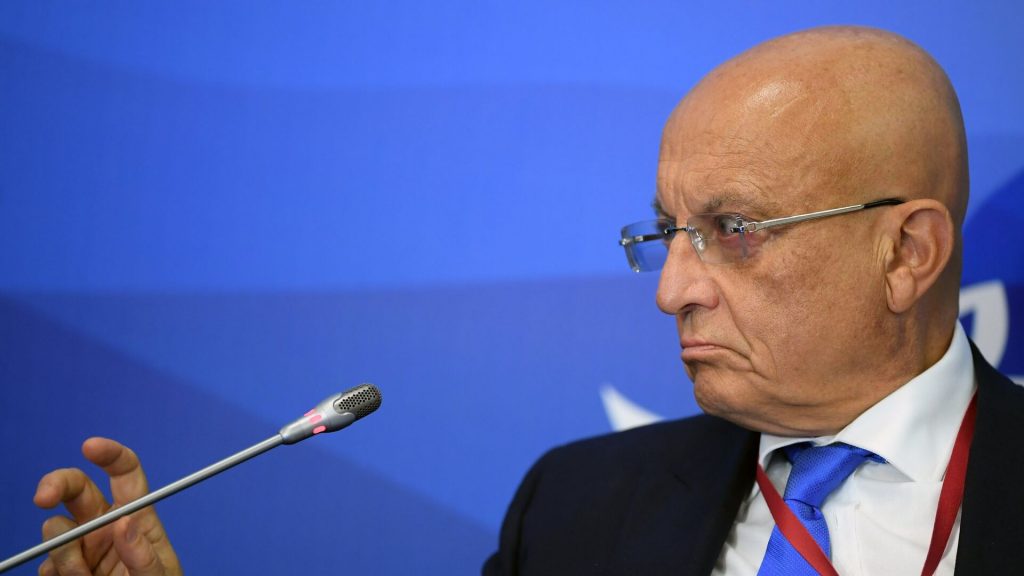
On Wednesday, February 21, the “Russia in Global Affairs” website published an article by Russian political scientist Sergei Karaganov “A Century of War. What to do”. In it, the author discusses Russia’s place in the global system of relationships, which is increasingly plunging into crisis and facing new military conflicts. According to the author, Moscow should adopt a policy code-named “Fortress Russia,” according to which Russia should avoid involvement in wars.
Key theses:
- “The extremely dangerous world of the next two decades requires correction of foreign and defence policies. I already wrote that they should be based on the concept of “fortress Russia” – the maximum possible independence, sovereignty, security, independence, concentration on internal development. But, of course, not autarky – it is deadly. We need reasonable openness for beneficial economic, scientific, cultural, and information cooperation with friendly countries of the World Majority (WM). But openness is not an end but a means serving internal material and spiritual development.”
- “Liberal-globalist openness, as we have already seen, is mortally dangerous. The desire to integrate into “international value chains” at any cost is stupidity when the very creators of the previous model of globalisation are destroying it and militarising economic ties. The role of interdependence as a tool for maintaining peace has been overestimated, but now it is predominantly dangerous.”
- “The “Fortress Russia” policy requires maximum non-involvement in conflicts that will break out during the ongoing “geostrategic earthquake.” In the new conditions, direct involvement is not an asset but a liability. The former colonial powers, and especially the United States, which are faced with growing anti-Americanism and attacks on their bases, are beginning to experience this. These and other foreign direct assets will become increasingly vulnerable, which should be indirectly promoted by increasing the cost of the American empire and promoting the recovery of the American foreign policy class from the globalist hegemonic disease of the post-war years, especially the last thirty years.
- “Siberization” of Russia, a shift in the centre of its spiritual, political, and economic development to the Urals and all of Siberia, and not just the Pacific part, with accelerated development in addition to the Northern Sea Route and latitudinal highways, meridional roads. Involving the countries of Central Asia in this strategy, with their labour surplus, but also a shortage of water and water-intensive goods, revitalising the Northern Silk Road.”
- “In the current global conditions, the unconditional priority should be the development in the society of defence consciousness, readiness to defend the Fatherland, including with arms in hand. The number of “snowflakes” in our society should melt, and the number of warriors should grow. This is the development of our competitive advantage, necessary for the world of the future – the ability and willingness to fight, which resulted from a difficult history of a successful struggle for survival on a giant plain open on all sides.”
- “The vector of today’s foreign policy is the comprehensive development of relations with the countries of the World Majority (WM). Another obvious but not yet formulated goal is to organise with partners in the World Bank the most peaceful withdrawal of the West from the dominant positions that it occupied for almost five centuries and the United States from the hegemonic positions acquired for a decade and a half since the late 1980s to more a modest but worthy position in the world system. There is no need to drive. Considering the vector of Western development, they will leave on their own.”
- “The UN is a fading entity, overrun by the Westernising apparatus and therefore not reformable. There is no need to destroy, but it is necessary to build parallel structures based on BRICS+, the expansion of the SCO, and their integration with the Organization of African Unity, the League of Arab States, ASEAN, and MERCOSUR. At an intermediate stage, it is possible to create a permanent meeting of these institutions within the UN.”
- “If we are a civilisation of civilisations, then why not, together with our friends and partners, begin to build an organisation of organisations – the prototype of the future UN?”
- “Beijing is the main external resource for our internal development, an ally and partner for the foreseeable future. It is worth promoting the development of China’s naval and military-strategic power to deprive the United States of the role of an aggressive hegemon and facilitate its transition to a position of relatively constructive neo-isolationism similar to the 1930s, naturally adjusted for the new world.”
- “China and Russia are complementary powers. Their coalition, if it can be preserved, and this must be achieved, over the years can become a determining factor in the construction of a new world system. It’s gratifying that modern Chinese foreign policy philosophy is close to ours.”
- “India is another natural ally in creating a new world system and preventing a slide into World War III. The country is a source of important technologies, a labour force for the new development of Siberia, as well as an almost bottomless market. The most important task is to involve India in the work of building the Greater Eurasian Partnership, from which it is still somewhat aloof, to prevent it from becoming an unfriendly balancer of China, which is what the United States is pushing for, and to smooth out the natural competition between India and China. The Primakov triangle Russia – China – India is a guarantor of the relatively peaceful development of Greater Eurasia.”
- “Europe – once our and many other nations’ modernisation beacon – is quickly moving towards geopolitical insignificance and, I hope to be mistaken, towards disintegration. The still rich market is worth trying to exploit, but the main vector concerning the subcontinent is moral and political exclusion. Having first lost their soul – Christianity, they also lose the fruits of the Age of Enlightenment – rationalism. In addition, the European bureaucracy, at external orders, is imposing rejection on Russia. Let’s thank her.”
- “In the Russian tradition – inflicting a crushing defeat on a European invasion, followed by agreement on a new order.”
- “Russian policy must publicly proceed from the fact that NATO is a hostile bloc that has proven its aggressiveness through its past policies and is de facto waging war against Russia. Therefore, any, including preemptive nuclear strikes against it, are morally and politically justified. First of all, this applies to countries actively participating in supporting the “Kyiv junta.”
- “North Korea feels more confident and is increasing its status in the international arena, especially after Russia finally stopped dragging behind the West and de facto resumed cooperation with Pyongyang. Limited nuclear proliferation may also be useful as a barrier to the creation and use of biological weapons.”
- “Of course, some countries should be permanently and firmly deprived of the right to possess a nuclear arsenal or even come close to acquiring one. Germany, which started two world wars and committed genocide, must become a legitimate target of a pre-emptive strike and be simply destroyed if it reaches out for a nuclear bomb. However, already now, having forgotten about its monstrous history, it is running into such punishment, acting as a revanchist state, the main European sponsor of the war in Ukraine.”
Outcomes and outlook:
Sergei Karaganov is one of those experts whose articles are very carefully studied in the West since he influenced the formation of modern Russian ideology. In this case, we are talking about the fact that Karaganov is trying to paint a picture of the world from the point of view of new processes occurring in Eurasia and on the planet as a whole. He talks about the decline of Western civilisation (a favourite topic in the discussions of modern Russian philosophers and political scientists). Talks about threats to Russia and the West’s plans for Russia. Karaganov tries to make his picture of the world holistic, but the article contains many contradictory theses. In any case, Karaganov’s view is that of a “hawkish ideologist” in Russian politics; this article echoes the posts and tweets of Dmitry Medvedev. It is directed primarily to external information consumers – following up on Putin’s interview with Tucker Carlson. But in any case, it should be perceived solely as an attempt to theorise on geopolitics and Russia’s role in new processes, but not as a “guide to action.”

